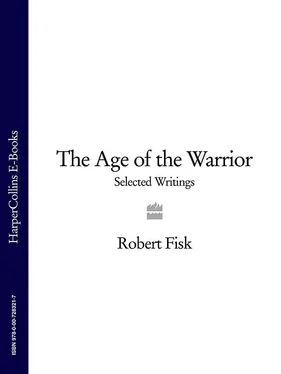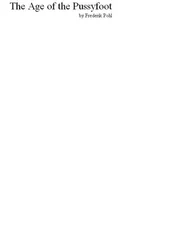Perfection, of a kind, was what he was after,
And the poetry he invented was easy to understand; He knew human folly like the back of his hand, And was greatly interested in armies and fleets…
In an age when we are supposed to believe in the ‘War on Terror’, we may quarry our way through Shakespeare’s folios in search of Osama bin Laden and George W. Bush with all the enthusiasm of the mass murderer who prowls through Christian and Islamic scriptures in search of excuses for ethnic cleansing. Indeed, smiting the Hittites, Canaanites and Jebusites is not much different from smiting the Bosnians or the Rwandans or the Arabs or, indeed, the modern-day Israelis. And it’s not difficult to find a parallel with Bush’s disasters in Afghanistan and Iraq – and his apparent desire to erase these defeats with yet a new military adventure in Iran – in Henry IV’s deathbed advice to his son, the future Henry V:
… Therefore, my Harry,
Be it thy course to busy giddy minds With foreign quarrels, that action, hence borne out, May waste the memory of the former days.
The wasteland and anarchy of Iraq in the aftermath of our illegal 2003 invasion is reflected in so many of Shakespeare’s plays that one can move effortlessly between the tragedies and the histories to read of present-day civil war Baghdad. Here’s the father, for example, on discovering that he has killed his own child in Henry VI, Part III :
O, pity, God, this miserable age!
What stratagems, how fell, how butcherly, Erroneous, mutinous and unnatural, This deadly quarrel daily doth beget!
Our treachery towards the Shi’ites and Kurds of Iraq in 1991 – when we encouraged them to rise up against Saddam and then allowed the butcher of Baghdad to destroy them – was set against the genuine cries for freedom that those doomed people uttered in the days before their betrayal. ‘… waving our red weapons o’er our heads,’ as Brutus cried seconds after Julius Caesar’s murder, ‘Let’s all cry, “Peace, freedom, and liberty”.’
My own experience of war has changed my feelings towards many of Shakespeare’s characters. The good guys in Shakespeare’s plays have become ever less attractive, ever more portentous, ever more sinister as the years go by. Henry V seems more than ever a butcher. ‘Now, herald, are the dead numb’red?’ he asks.
This note doth tell me of ten thousand French
That in the field lie slain; of princes, in this number, And nobles bearing banners, there lie dead One hundred twenty-six; added to these, Of knights, esquires, and gallant gentlemen, Eight thousand and four hundred…
Henry is doing ‘body counts’. When the herald presents another list – this time of the English dead – Henry reads off the names of Edward, Duke of York, the Earl of Suffolk, Sir Richard Kikely, Davy Gam, Esquire:
None else of name; and of all other men
But five and twenty. O God, thy arm was here…Was ever known so great and little loss On one part and on th’other?
This is pure Gulf War Part One, when General Norman Schwarzkopf was gloating at the disparate casualty figures – while claiming, of course, that he was ‘not in the business of body counts’ and while General Peter de la Billière was telling Britons to celebrate victory by ringing their church bells.
Shakespeare can still be used to remind ourselves of an earlier, ‘safer’ (if non-existent) world, a reassurance of our own ultimate survival. It was not by chance that Olivier’s Henry V was filmed during the Second World War. The Bastard’s final promise in King John is simple enough:
Come the three corners of the world in arms,
And we shall shock them. Naught shall make us rue, If England to itself do rest but true.
But the true believers – the Osamas and Bushes – probably lie outside the history plays. The mad King Lear – betrayed by two of his daughters just as bin Laden felt he was betrayed by the Saudi royal family when they rejected his offer to free Kuwait from Iraqi occupation without American military assistance – shouts that he will ‘do such things/What they are yet, I know not; but they shall be/The terrors of the earth.’
Lear , of course, was written in the immediate aftermath of the Gunpowder Plot, a ‘terrorist’ conspiracy with potential 11 September consequences. Similarly, the saintly Prospero in The Tempest contains both the self-righteousness and ruthlessness of bin Laden and the covert racism of Bush. When he sends Ariel to wreck the usurping King Alonso’s ship on his island, the airy spirit returns with an account of his success which – despite his subsequent saving of lives – is of near Twin Towers dimensions:
Now in the waist, the deck, in every cabin,
I flam’d amazement. Sometime I’d divide, And burn in many places… Not a soul But felt a fever of the mad, and play’d Some tricks of desperation. All but mariners Plung’d in the foaming brine, and quit the vessel; Then all afire with me; the King’s son, Ferdinand, With hair up-staring then like reeds, not hair Was the first man that leapt; cried “Hell is empty, And all the devils are here”.
In almost the same year, John Donne was using equally terrifying imagery, of a ‘fired ship’ from which ‘by no way/But drowning, could be rescued from the flame,/Some men leap’d forth…’ Prospero’s cruelty towards Caliban becomes more frightening each time I read of it, not least because The Tempest is one of four Shakespeare plays in which Muslims appear and because Caliban is himself an Arab, born of an Algerian mother.
‘This damn’d witch Sycorax,/For mischiefs manifold, and sorceries terrible/To enter human hearing, from Argier/Thou know’st was banish’d…’ Prospero tells us. ‘This blue-ey’d hag was hither brought with child… /A freckl’d whelp, hag-born not honour’d with/A human shape.’
Caliban is the ‘terrorist’ on the island, first innocently nurtured by Prospero and then condemned to slavery after trying to rape Prospero’s daughter, the colonial slave who turns against the fruits of civilisation that were offered him.
You taught me language, and my profit on’t
Is, I know how to curse. The red plague rid you For learning me your language!
Yet Caliban must ‘obey’ Prospero because ‘his art is of such power’. Prospero may not have F-18s or bunker-busters, but Caliban is able to play out a familiar Western narrative; he teams up with the bad guys, offering his help to Trinculo – ‘I’ll show you the best springs; I’ll pluck thee berries;/I’ll fish for thee…’ – making the essential linkage between evil and terror that Bush vainly tried to claim between al-Qaeda and Saddam. Caliban is an animal, unworthy of pity, not honoured with a ‘human shape’. Compare this with an article in the newspaper USA Today , in which a former American military officer, Ralph Peters – arguing that Washington should withdraw from Iraq because its people are no longer worthy of our Western sacrifice – refers to ‘the comprehensive inability of the Arab world to progress in any sphere of organised human endeavor’. *Prospero, of course, prevails and Caliban survives to grovel to his colonial master: ‘How fine my master is! I am afraid/He will chastise me/… I’ll be wise hereafter,/And seek for grace…’ The war of terror has been won!
Shakespeare lived at a time when the largely Muslim Ottoman empire – then at its zenith of power – remained an existential if not a real threat for Europeans. The history plays are replete with these fears, albeit that they are also a product of propaganda on behalf of Elizabeth and, later, James. In Henry IV, Part I , the king is to set out on the Crusades:
As far as to the sepulchre of Christ…
Читать дальше












